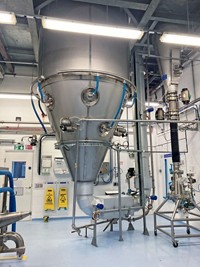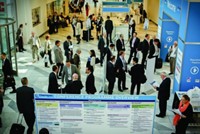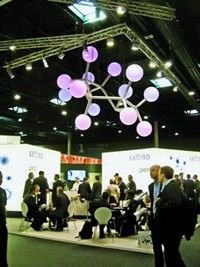Advertisement
Grab your lab coat. Let's get started
Welcome!
Welcome!
Create an account below to get 6 C&EN articles per month, receive newsletters and more - all free.
It seems this is your first time logging in online. Please enter the following information to continue.
As an ACS member you automatically get access to this site. All we need is few more details to create your reading experience.
Not you? Sign in with a different account.
Not you? Sign in with a different account.
ERROR 1
ERROR 1
ERROR 2
ERROR 2
ERROR 2
ERROR 2
ERROR 2
Password and Confirm password must match.
If you have an ACS member number, please enter it here so we can link this account to your membership. (optional)
ERROR 2
ACS values your privacy. By submitting your information, you are gaining access to C&EN and subscribing to our weekly newsletter. We use the information you provide to make your reading experience better, and we will never sell your data to third party members.
Business
Market Cycles Evident At 2015 Chemspec Trade Show
Pharma ascends as agchem slumps at the European chemicals expo in Cologne
by Rick Mullin
July 13, 2015
| A version of this story appeared in
Volume 93, Issue 28

With the rest of Europe on tenterhooks over the possibility that the situation in Greece could wreak havoc on financial markets, chemical companies meeting in Cologne, Germany, for Chemspec Europe expressed confidence in business going forward.
Despite a downturn in the cyclical agricultural chemicals market, exhibitors were nearly unanimous in their optimism regarding the full range of fine and specialty chemicals markets that account for the trade show’s theme.
Notably, pharmaceutical chemicals, which have had a diminished profile at Chemspec in recent years, made a particularly strong showing at the 2015 event, which took place during the last week of June. Contract manufacturers of active pharmaceutical ingredients (APIs) set up booths in full force.
If agricultural chemicals were more prominent around the exhibit hall, they were also a cause for concern. In addition to high inventory levels for many chemical products—an overstocking that is likely to take two years to work down—regulatory constraints on pesticides are increasing.
However, some relief may be ahead on the regulatory front. Company executives have their eyes on the Transatlantic Trade & Investment Partnership, or TTIP, a trade deal currently being negotiated between the U.S. and Europe that may impact pesticide approval.
Any agreement will likely include arrangements for preshipment testing of maximum chemical residue levels in food and beverage products, according to Neil Harvey, head of international trade at the Chemical Industries Association, a U.K. industry group. TTIP might also include a joint U.S.-U.K. assessment program.
“The sharing of resources and information by the EU and U.S. regulators in this area should speed up the [pesticide] approval process,” said Harvey, who spoke at a conference on agricultural chemicals sponsored by the European Fine Chemicals Group in association with Chemspec.
Overall, exhibitors agreed that the slump in agricultural chemicals is largely a result of natural cycles in the market. “To some extent, we’ve had it good in agchem for the last three years, so it really looks bad to us now, but it might not be that bad,” said Tony Bastock, managing director of Contract Chemicals, a U.K. fine chemicals firm that does more than half its business in agricultural chemicals.
“Across the broad church of the chemical industry, the economies are doing quite well—especially in the industrialized countries such as the U.K. and Germany,” Bastock said. “All in all, there is encouraging noise from customer industries, and everybody is pretty buoyant.”
Observations varied across the exhibit floor, however. Many companies are working on assimilating or stimulating businesses recently acquired, or are adjusting to changes in management.
Paul Vierendeels, European business development director for polymers and specialty chemicals at WeylChem, the nonpharmaceutical division of the German holding company International Chemical Investors Group, said business is “a bit of a mixed bag, with certain sectors feeling slow and 2016 appearing slow.” In addition to a depressed agricultural sector, he said, the polymers market has not picked up significantly despite improvements in the economy. The net result, he added, is single-digit growth for his division.
For WeylChem, the action has been on the acquisition front. Two recent additions are AllessaChemie and Clariant’s detergent business, both purchased in 2014.
Uwe Brunk, general manager for acetyls at the German fine chemicals maker CABB, said sales are “above budget,” with particular strength in personal care, which he noted is not a cyclical business. The market leader in monochloroacetic acid (MCAA), CABB is set to add MCAA capacity in China, where it recently took over production at a joint venture making 25,000 metric tons per year. The new capacity, using technology from Germany, will add 25,000 metric tons of higher quality MCAA.
Brunk said his unit, which does 10 to 15% of its business in herbicides, is closely watching developments at Dow Chemical, which is introducing a system called Enlist. Intended for crops that are resistant to the herbicide glyphosate, Enlist combines glyphosate with 2,4-dichlorophenoxyacetic acid, or 2,4-D. Brunk noted that Dow uses MCAA to produce 2,4-D.
Although nonpharma markets held sway as usual at Chemspec, there was an unmistakable surge in the presence of pharmaceutical chemical companies on the exhibit floor. Attendees concurred that the custom pharma chemicals market is particularly strong, citing a return of projects from China and India to Europe and advances in drug company pipelines.
Siegfried, a Swiss custom manufacturer of APIs, occupied a full-sized booth near the entrance to the hall, across the aisle from the comparably sized Lonza booth.
Marianne Späne, director of business development and sales at Siegfried, viewed this as appropriate. After all, Siegfried rivals Lonza, the historical market leader, in the pharmaceutical chemicals business following its acquisition of BASF’s pharma unit in May. That deal, which included plants in Germany, Switzerland, and France, effectively doubled Siegfried’s annual sales to more than $600 million.
Siegfried is also ready to open a plant in China as large as its manufacturing home base in Zofingen.
“For the last four years, we have been coming here with a small booth,” Späne said. “But I said this year, we should do either a really nice booth and say, ‘Look, Siegfried is here,’ or we don’t do it.”
Other fine chemicals producers with significant API businesses were on hand at Chemspec, some with ownership or management changes since last year. The German firm CU Chemie Uetikon, for example, was acquired in May by Novacap, a French firm with businesses in minerals, cosmetic chemicals, and pharmaceuticals, including a generic API portfolio acquired from Rhodia.
Thomas Seeler, chief executive officer of Uetikon, explained that Novacap was interested in adding custom APIs and that Uetikon, with a production facility in Lahr, Germany, will continue to operate independently.
Chemspec management made an effort to spotlight API manufacturing and research services by scheduling panel discussions in which representatives of fine chemicals companies joined R&D managers at Bristol-Myers Squibb and Sanofi to discuss pharmaceutical outsourcing. The panels focused on the risks and benefits of drug research and manufacturing partnerships. Panelist Rudolf Hanko, CEO of Siegfried, noted that although contract manufacturing and services until recently “were not seen as a permanent fixture,” they are now a routine element of pharmaceutical research and manufacturing strategies.
Whether the pharmaceutical contract manufacturer will become a more permanent fixture at Chemspec is yet to be seen. Späne said Siegfried’s purchasing team got more from the event, as they were able to meet with chemical suppliers, than did its contract manufacturing sales staff.
“Chemspec is still not an exhibition for pharmaceutical ingredients,” she said. But Siegfried is already looking ahead to Chemspec in 2016. “We are confident that we can contribute to turning the chemical customer focus to more of a pharmaceutical focus,” Späne said. “We will make another investment in the next exhibition, in Basel.”





Join the conversation
Contact the reporter
Submit a Letter to the Editor for publication
Engage with us on Twitter